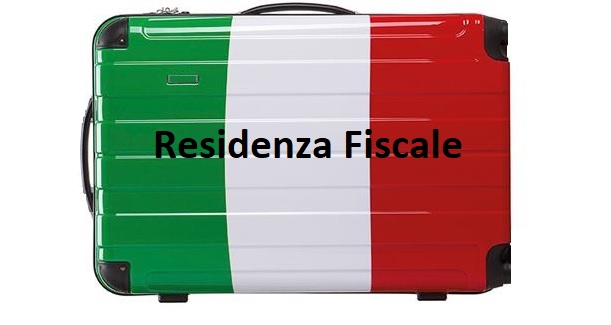

The message for cooperation amongst States and Tax offices (“CRS”) should have been already very clear for individuals who tried to exit the Italian tax regime without a substantial comfort (including their domicile and habitual home) with a focus on the entire family.
According to Italian rules, in order to cease to be regarded as resident, an Italian citizen should enrol in AIRE (the Register for Citizens who are resident abroad); however this is not sufficient to establish the tax residence outside the Country. Notwithstanding the citizenship, an individual is to be deemed an Italian taxpayer if, for the majority of the tax period (“183 days rule”):
- he or she is enrolled in the local register of the resident population; or
- he or she has established in Italy his/her residence; or
- he or she is regarded to have with his/her domicile in Italy.
The new rule is also going to have a deep impact on people with dual citizenship or with a tax residence in black list Countries (e.g. Switzerland, Monaco, Bahamas) where there is an inverted burden of proof or in Countries where there is not a treaty protection (e.g. UK res not dom).
On March 3rd 2017, the Italian Tax Administration published a press release to comment on the awaited directorial decree related to the newly presented rule regarding people who changed their tax residence since 2010 included (Law Decree n. 193/2016 converted into Law 225/2016).
The (not so) hidden message is therefore very strong and can be summarized as follows:
«Dear Non Resident Taxpayer,
We are writing to you in order to recommend to have a tax assessment as soon as possible and to consider the (open) opportunity to enter the new voluntary disclosure programme! We will verify in detail all the “big data” and, as you certainly know, we are already receiving a lot of information from foreign Tax administrations because of the CRS. Following Law Decree n. 193/2016, we will receive, from Italian local administrations, all information regarding your local activities and assets; therefore, we will soon proceed to verify if your change of tax residence is to be regarded as fair and substantial, including the date related to which tax year to consider.
Yours Faithfully
Italian Tax Administration»
According to Italian tax praxis, the rules on tax residency are not net and we have many cases before the (tax) Judges or cases which received final position form the Court, often with the victory of the Tax Administration. Some cases miss the basic rules of tax planning, but others have to be regarded to have more controversy.
Circular n. 304 of 12th February 1997 is a landmark for these cases, in particular because it gives the definition of the meaning of residence and of domicile. Residence is the effective and habitual adobe, while domicile is the place where the taxpayers live socially and/or economically. The tax meaning is therefore wider than the one in the Italian civil code provisions.
The explanation above has to be considered in the context of the whole family. Therefore, it is not sufficient to assert that the husband is living in Switzerland and the wife and the children remain in Italy; the evidence would say that the taxpayer domicile is (still) Italy. The exact time when the tax residence changes is therefore an important item to assess.
Obviously, it is not so simple to assess each case. The Supreme Court statements must be carefully considered. The tax residence is to be regarded notwithstanding short or long absences due to study, work, health or leisure. Controversy arises upon the concept of “home” in order to verify the taxpayer domicile as he or she “shows an intention to keep it as the centre of his family and social relationship” (Supreme Court n. 1738/1986). Particular attention has been given by the Court of Milan (Judgment 3665/2015) defining domicile as the place where an individual keeps the centre of his/her interests: “meaning not only from an economic and asset perspective, but also from a moral and family one”.
As known, the International criteria of “vital centre of interests” is also the cornerstone for the Italian Tax Administration.
On March 3rd 2017 the Italian Tax Administration Director published relevant guidelines related to the definition of the “selective list” of taxpayer to be audited.
The Tax Office, in accordance with the new laws, is going to acquire information from local municipalities and other States (e.g. according to OCSE CRS, EU Directives and FATCA) in order to create the list of taxpayers to be submitted to full tax audit.
According to the published documents, the Tax Administration will analyse all compulsory received data by following this ranking:
- Declared tax residence within black list Countries (according to art. 2, §2bis, Italian Consolidated Tax Code)
- Movements of capital from and to foreign states
- Information regarding real estate assets and financial assets received from automatic exchange of information among States (e.g. CRS)
- Tax residence in Italy of family members related to the taxpayer declaring his or her tax residence abroad
- Stamp Duty Register in order to verify the presence of the taxpayer (with his or her fiscal code)
- Telephone and Utility bills
- Availability in Italy of cars, motorbikes or boats
- Italian active Vat numbers
- Participations on Italian partnerships or companies with few shareholders
- Presence as company or club directors or similar positions
- Information about households, butler or similar functions
- Information gathered by financial intermediaries and similar entities regarding taxes withheld on behalf of the taxpayer
- Relevant information regarding the tax database of taxpayers expenditure (so called “spesometro”)
For Italy, the Tax Office plans are not brand new policy. We have had already experience of considerable attention to the move of residence of people (e.g. circular newsletter n. 140/1999), but on this occasion, it must be highlighted that the plan is boosted by an unprecedented set of protocols for the exchange of tax information, which is already active and signed. It is a clear International political intention aiming to clamp down on aggressive tax planning practices. The list of jurisdictions, which cooperate with Italy, is remarkable and contains many tax havens, which are now regarded by Italy as Countries with an active exchange of information.
It is important to highlight that it may be convenient for genuine taxpayers who moved their tax residence abroad to enter the VDP (Voluntary Disclosure Programme) but with some issues which remain that are related to open tax years. The general rule still doubles the relevant years for some black list territories and the combination of laws could really help and present a convenient option for the taxpayer because the doubling is not effective under the VDP.
For example, a whole family (spouses/couples and children) and everything (e.g. financial assets, the selling of a house in Italy and the purchase of one in Switzerland) moved to Switzerland in 2012. There is no doubt that they will pass the test of “selective list”, but what about the past years? Generally for Switzerland, the tax period is to be regarded back to 10 tax years, because the Country is still classified black list. Within the Italian VDP, Switzerland is however considered to be relevant only from 2009/2010, as a black list Country with effective cooperation within the voluntary disclosure programme, and, therefore, treated as white list. This would also resolve many issues related to money laundering, with a particular attention to the taxpayers’ advisors and financial intermediaries.
For other cases, it is possible to resist making a distinction between a case of black list Countries – where the burden of proof is by law inverted – and a non-black list Countries.
Article 2, § 2bis, of the Italian Consolidated Tax Code is applicable to “black list Countries and territories for Individuals”. It is necessary to provide the Tax Office with utility bills as a proof for the foreign home, schools and other specific costs related to work and social expenses, in particular, if compared with costs and expenses related to similar activities in Italy (e.g. sport clubs, marina, renting, etc.). Further proof should be appropriate, like bank statements, which prove the daily expenditures related to family life. For unmarried people it would be convenient to give access to information also related to partners, boyfriends or girlfriends.
For taxpayers who moved to non black list Countries the proof is on the Tax office, but the quality of information we recommend to keep, in case of queries, is mainly the same as described above.
In conclusion, it is now time to verify and assess the effective tax residence of each client, being an Italian citizen or a tax resident in Italy who moved out since 2010 included. It is time to give the opportunity, if needed, to enter the Italian VDP with significant reductions of sanctions and the removal of crimes, punished by law, related to tax crimes. With the consequence of a real “tail” for clients’ advisors.








